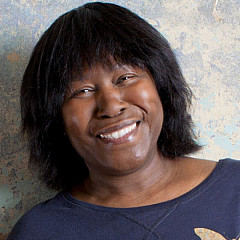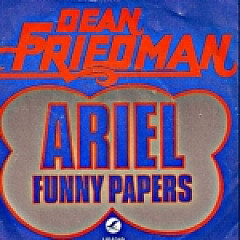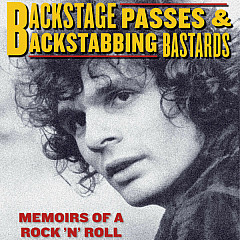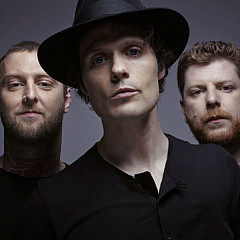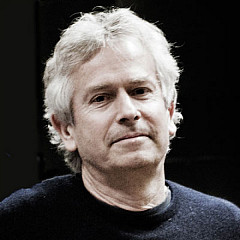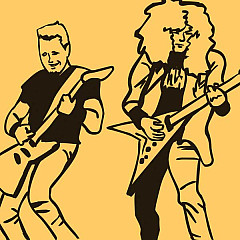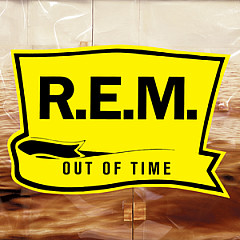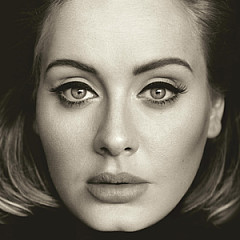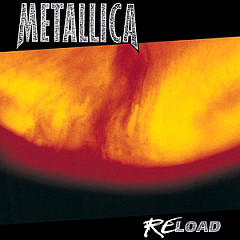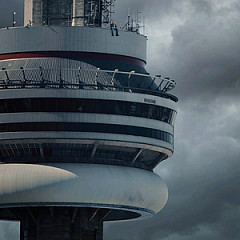 "Damn, I Wish I Was Your Lover"
"Damn, I Wish I Was Your Lover" Artist: Sophie B. Hawkins
Writer: Sophie B. Hawkins
Album: Tongues and Tails
Label: Columbia
Year: 1992
Chart Positions: US: #5, UK: #14
And you'd be right.
But it was a dark cloud.
"I was totally frightened by fame," she says. "I always feel, no one's going to want to take a picture with me. No one's going to know who I am. I admire people like Katy Perry, people who can feel their power and feel their fame. It's part of their persona and part of their being. I never felt like that. It's so horrible in a way because maybe I could have had more fun with it. I'm always more concerned about the thing that's happening next."
When she was pitching the demo with "Damn" on it, it seemed like everyone in the industry knew who she was. Seymour Stein wanted to sign her to Sire, Clive Davis wanted to sign her to Arista, Donny Ienner wanted to sign her to Columbia. The reason she went with Columbia was because of... Laura Nyro.
Next after "Damn I Wish I Was Your Lover" was the second single Columbia released, her cover of Bob Dylan's "I Want You," the only track on the album over which there was some critical differences of opinion. The Top 40-listening public didn't care for it. But one particular artist did. Bob Dylan himself.
"I was on a plane going to Los Angeles, sitting in coach, and Dylan's manager came back into coach to talk to me. He said Bob heard my version of 'I Want You' and really liked it."
They invited her to Dylan's 30th Anniversary tribute concert coming up that October at Madison Square Garden in New York City. Still miffed by the song's poor chart showing, Sony didn't include Hawkins' performance on the album or the video of the concert. Which hurts her to this day.
"People still stop me on the street and they say that I was the highlight of that concert. Every time it appears on YouTube it disappears just as fast. One person said to me the other day that it changed his life. So, I don't know why they didn't include me."
The song that changed Sophie's life was written at the end of the '80s. She'd just been fired by Bryan Ferry after two weeks as his marimba player (an instrument she'd studied at the Manhattan School of Music). "So then I went home and I don't think I was disappointed. I think I was proud of myself for having lasted that long. I just said to myself, well, good, now I get to write songs."
As far as who originally inspired the song, Sophie wouldn't commit to an answer. "I'm going to be very honest with you. There may have been a person that triggered the feeling, but I feel strongly that the most meaningful teachings come from our child self somewhere back in time when we couldn't express these incredible feelings. When we finally start developing as artists we find a way to express them. So, 'Damn, I Wish I Was Your Lover' truly is my anthem and I'm learning things about it all the time. Only as I grow do I grow into knowing why I wrote it. And so, while I want to say maybe somebody triggered the song, that person is irrelevant and long-forgotten."
Musically, the song was the result, as so many of rock's greatest moments are, of an accident.
The demo version was probably done around '89, but it could have been '88. I remember it was the end of the summer and it felt to me that for the whole summer, I was looking for some music to really move me. I had written a lot of songs, but I remember, for instance, going to my aunt's house in Massachusetts, or going places and always playing on someone's piano, looking for that something. When the chords finally did come out, it was because my hand slipped. Maybe I was tired, but that was the mistake I was looking for, because the change sounded so big and it also sounded so serious. Those emotions were what I was looking for, something unlike what I had done before. I almost shivered because I thought, Now this is the big song you've been waiting for. There was this strange sense. It was like something big was coming. You've never been able to do it before and now you have to do it. It was like a baby coming out. Now that I've had a child, I can sense it was like the feeling that you may not be able to do it or that it may go badly - just an indescribable fear - but also knowing that you can't do anything about it.
The first lyrics came right out, "That old dog has chained you up alright." I'm pretty sure the first verse came out at the same time. Using the word "damn" wasn't the part that worried me. The part that worried me was the 16-bar bridge and the three verses. I thought, It's not going to fly. But I also thought it's integral to the story that I felt so emotionally attached to.
 I never show anything until I fully record it. So, I recorded it. I had a reel-to-reel recorder that I had borrowed from a cab driver. It probably took two days of really enjoying recording it, because once the song started to come out and I had the rhythm of the verse and the rhythm of the chorus, the phonetic feeling of the lyrics, then it was really fun to record and write the rest of it.
I never show anything until I fully record it. So, I recorded it. I had a reel-to-reel recorder that I had borrowed from a cab driver. It probably took two days of really enjoying recording it, because once the song started to come out and I had the rhythm of the verse and the rhythm of the chorus, the phonetic feeling of the lyrics, then it was really fun to record and write the rest of it.And that's the original demo that sounds like an unwieldy beast, but I loved it. Probably the first person I played it for was my roommate a few months later and she didn't get it. She didn't think it was good. And I played it for another person who didn't get it. He didn't think it was good. But I was attached to it. I thought it was good.
I made copies of my demo tape adding as many songs as you can fit on a cassette. I would write my name on it and my phone number and I always had that demo tape on me. I had no illusions of being a singer. I was a songwriter and that's what I wanted to be.
So I was working as a coat-check girl in Manhattan on 46th Street. A lot of people would talk to me because I was this coat-check girl reading Anna Karenina. Steve Martin gave me a big tip. David Bowie asked me how his lipstick looked. Mark Cohn came in one day and he said, "You have such a beautiful speaking voice. I bet you're an amazing singer." I said I'm a terrible singer, but I am a songwriter. So, I handed him my demo tape.
Maybe two weeks later this guy Ralph Schuckett called me and he said, "I picked up this demo tape on the desk of JSM Music and I listened to it on my Walkman on the way back to Brooklyn and I think you should be making records." He said, "Come meet me at my studio in Brooklyn."
So, I put a kitchen knife in my pocket and I went to meet him because I thought he could be a rapist, you never know. He said, "We just have to clean these demos up a little bit and I think I can get you a deal."
That, of course, started a fight. I'm not changing anything. But he did convince me to at least work with him and clean up the demo. We never changed the writing at all, but he made it better, with a simpler percussion line. He tried to make my vocals better because he probably thought I was an awful singer. And that was the demo we sent around. But it ended up being the original demo that people heard and that we worked off when we were doing the album.
I didn't play the song live until the record was done. The first time was probably a performance for Sony. Then they went to radio and it became a huge radio hit. I'm not sure how long that took. In those days, you really had to hand it to the program directors. Then listeners had to call in. So, I remember doing radio from six in the morning 'til twelve at night. I went to truck stops, I went to McDonald's. I went anywhere that they wanted me to show up. I was asked to open for Neil Young and I wanted to open for Neil Young but it didn't happen. So, then I went out on tour with my band. The first gig I had was at the Montreux Jazz Festival. I guess they wanted me to get my feet wet in Europe. Then I played First Avenue in Minneapolis and Toad's Place in New Haven, Symphony Space in New York.
The song was going up the charts, because I remember getting faxes from Donnie [Don Ienner, head of Sony Music]. At shows, my encore was usually "I Want You," and "Damn" was the song just before the encore, because I wanted people to stick around for it. I didn't want people to leave right after hearing it. It's such a hard song to sing but I've always loved singing it.
 These days, I started writing my own show and I also recorded the songs and kept writing songs for a new album. I started looking for a producer, then I finally just recorded them in Brooklyn and I love what I have. I have a play that I'm three years into working on, and I have an album that I haven't released, because I didn't want another album to go nowhere like The Crossing [2012]. So, slowly but surely, I now have a team. What's also really been great is doing solo shows. That was frightening but so good for me, because even though I practiced all those years to be a drummer, I'm not really in my mind a good musician or a good singer. And so, to get up there alone was scary, but I've been doing that and I really got a lot out of it. All these things have led to a really good point now where it seems like I'm going to get a beautiful release for the album in Europe and maybe a deal so it can come out here.
These days, I started writing my own show and I also recorded the songs and kept writing songs for a new album. I started looking for a producer, then I finally just recorded them in Brooklyn and I love what I have. I have a play that I'm three years into working on, and I have an album that I haven't released, because I didn't want another album to go nowhere like The Crossing [2012]. So, slowly but surely, I now have a team. What's also really been great is doing solo shows. That was frightening but so good for me, because even though I practiced all those years to be a drummer, I'm not really in my mind a good musician or a good singer. And so, to get up there alone was scary, but I've been doing that and I really got a lot out of it. All these things have led to a really good point now where it seems like I'm going to get a beautiful release for the album in Europe and maybe a deal so it can come out here. It's funny, I always thought of myself as wanting to write great songs. I still dream of making a connection based on writing a great song. And "Damn, I Wish I Was Your Lover" is my anthem. It's my reason for being. So is "As I Lay Me Down." Those songs became the Sophie B. Hawkins classics. There are other songs that I really love that I wish would go somewhere, but you can't hope for that kind of support. Well, you can hope for it. I tried so long to make things happen. And then when I finally just observed what was going on, I said, "I could do it myself."
February 27, 2019
Further reading: Women Who Rock
More They're Playing My Song

